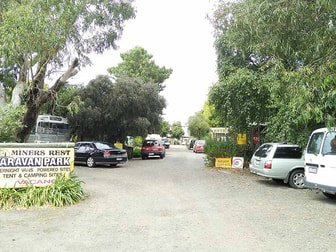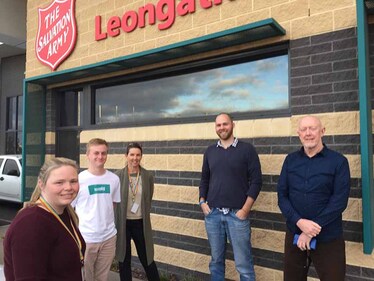 When the Miners’ Rest Caravan Park and Motel was bought for redevelopment, the 90-plus residents faced eviction and homelessness.
When the Miners’ Rest Caravan Park and Motel was bought for redevelopment, the 90-plus residents faced eviction and homelessness. WHEN The Salvation Army heard that the Miners Rest Caravan Park and adjacent Capital Motel in Wonthaggi would be redeveloped and residents moved on, they swung into action.
The role of the Army's Homelessness Services and Family Violence Services in Gippsland was to make sure more than 90 residents across 67 tenancies found a safe and stable place to call home – within 10 months.
The relocation project started in August 2019 when Bunnings purchased the site of the caravan park and motel with the intention of bulldozing it to make way for a new warehouse complex.
| “The Salvation Army had ongoing conversations with council and developers prior, and when Bunnings bought the property, we said that we wanted to work with them,” said Josh Baker, who worked as the project coordinator at the time, based out of nearby Leongatha Corps. “And they wanted to be part of processes every step of the way.” | The last resort: February 23, 2018 - Tom McNish talks to residents of the Miners Rest Caravan Park about their future. |
Luke Ollington had been a case manager with the Salvos for five months and was on his first day of university placement when he joined the project. The savvy social worker was thrown well and truly in the deep end as he compiled and sorted through the data, making sure that every number represented the needs, hopes and skills of residents.
“We found that this project shone a light on lack of affordable rentals in the area, especially along the Bass Coast; and the lack of crisis accommodation,” he said.
The Salvos team offered case management to every tenancy, with 60 taking up the offer.
The Open Door and Youth Homelessness teams explored the circumstances that brought residents to the park, whether they wanted to remain local, and what skills and work opportunities were open to them. The result was that residents found new homes, ranging from private rental, public housing and transitional housing to reconnection with family or another caravan park.
Given the lack of affordable housing in Gippsland, this was no small task. But, after meeting with residents, Josh and the team sought relationships with local real estate agents to break down stigma about potential tenants. In some cases, the Salvos were even able to supplement the original bond or rent. And, in other cases, residents were able to move or purchase their own movable dwellings using funding from the Salvos, the Department of Health and Human Services and Bunnings.
 The Salvation Army team from Homelessness and Support Services Gippsland worked from Leongatha Corps to support and resettle residents into permanent accommodation.
The Salvation Army team from Homelessness and Support Services Gippsland worked from Leongatha Corps to support and resettle residents into permanent accommodation. Thankfully, most of the team’s face-to-face interactions happened before COVID-19 impeded their work and, by August 2020, every resident who had asked for case management was assisted. This meant that the project wrapped up with 46 tenancies for long-term accommodation. Some were even offered jobs by Bunnings! And residents were followed up in later months to ensure they had adequate support.
The remaining tenancies included those who did not engage with services, found alternate accommodation without support from a partnering agency, or are couch surfing.
“At the start of this project, we really wanted to focus on each individual resident,” said Josh. “We wanted to ask, ‘What are your ambitions and goals? Do you want to learn new skills to get a job?’ There was a genuine sense that Bunnings wanted it to work for the community and that made our jobs easier.”
So, could the project be replicated elsewhere? Absolutely – and the Salvos Open Door team is hopeful that its work could be the baseline for another community. But for the moment, the chapter is closed on this one. A job well done.
This story was first published on Others, the Salvation Army website.